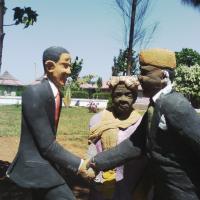Efforts are underway to gather key documents and a range of program ephemera and digitize them for preservation purposes. These include mission statements and annual reports, program brochures and promotional material and other documents that chart the institutional history of the Kenya program (KSP). Useful to researchers examining the history of study abroad programs more generally, this collection provides important insight into how the KSP evolved from 1972-present.In January 1972, St. Lawrence’s embarked on a pioneering trip to Kenya. Begun as a J-Term experiment, the St. Lawrence connection to East Africa evolved into the Kenya Semester Program (KSP) by 1974. From early origins as the Nairobi Semester, the program has grown into a truly East Africa semester.
Students today experience both the vibrant life of Kenya’s capital city as well as the regions diverse social and cultural landscape. From rural and urban homestays to field components across Kenya and northern Tanzania, the KSP introduces students to the culture and livelihood of African communities across the. The culmination of the semester evolved into the independent study, where students spend one month studying a diverse array of issues in not only Kenya but also Uganda, Tanzania and even Rwanda.
Reflecting on over 40 years in East Africa offers an important chance to preserve the past and explore the evolution and impact of the program through the experiences of those who participated. With over 2000 alumni from more than 30 different universities the program has had a wide impact on both U.S. students and our Kenyan partners. Fostering mutually beneficial relationships has been an essential part of the program’s mission.
Since the early 1980's full scholarships have been awarded each year to Kenyan students annually to attend with many returning “home,” with St. Lawrence degrees providing a pathway to leadership positions across the country. And since 1992, SLU has offered a two-year position as visiting Swahili instructor to Kenyans who are able either to conduct research towards a Ph.D. from a Kenyan university or to earn a master's degree from SLU. Alumni have also been at the heart of nurturing SLU’s deep engagement in Kenya, with many offering generous support for local development and educational projects across the country.
The following pages are a living attempt to document the depth and scope of the St. Lawrence-Kenya connection. The collection is designed as both a living repository for student experiences and as a growing research collection to examine the long term impact of study abroad. As a digital archive we are always looking for new materials and perspectives to add to our collection.


